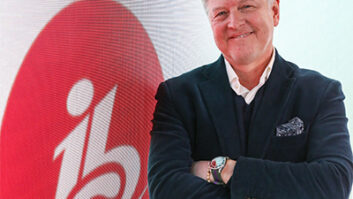
As IBC2010 opened, we talked to Michael Crimp, the organisation’s CEO, and asked first how IBC is evolving to face the challenges of the post-recession, highly connected online world?
“IBC is run by the industry for the industry, which makes us a good reflection of the industry,” Crimp said. “Buyers and sellers are changing the way they do business, and we have to change too. We have to be much more than a technical trade show.
“Our industry has always been based on skills and experience, but the foundation is shifting,” Crimp continued. “To take just one obvious example, there is a trend away from point products towards integrated systems which talk to each other on multiple levels, including sharing content as files – a very different architecture.”
What does this mean for IBC, and what changes are needed to accommodate it? “IBC is already in good shape, because it has always been the place to share experiences and invest in knowledge,” Crimp explained. “We add value to the visitor’s time at IBC through initiatives like training, screenings, special presentations and opportunities to network.
“Looking to the future these will become even more important. We work closely with all of our stakeholders and together we have identified some key drivers for the industry going forward.”
According to Crimp, the strategic direction of IBC will include a greater emphasis on top-level staff – because purchasing decisions are increasingly made at the enterprise level, on business grounds – together with an awareness of trends in consumer electronics. Finally, with growing concerns about a skills shortage, IBC takes seriously its responsibilities towards training and bringing young people into the industry.
“In 2009 we took the decision to increase the number of high level, strategic sessions in the conference, to put IBC into the diaries of CEOs,” Crimp said. “This year we are extending that programme, so we have for instance, Sir Michael Lyons of the BBC Trust starting a debate on public service broadcasting and Kent Novak of Texas Instruments putting the increasing power of the chip into context.
“Sport is the most powerful genre for building audiences, with huge sums at stake and continuing technical challenges to solve,” he added. “That is why we have added a sports day to the conference this year, with top level speakers including Manolo Romero from Olympic Broadcasting Services and Peter Angell from HBS.”
The Connected World is a new feature at IBC2010, featuring the latest in consumer electronics as well as new platforms like mobile and online television and digital out of home. Does this mean that IBC has plans to become a consumer show?
“Absolutely not,” Crimp asserted. “But audiences are changing the ways they consume media, and as creators and deliverers we have to understand and react to those changes. The Connected World is another important part of IBC’s future strategy: it is the focal point for debate on how conventional broadcasters have to evolve and how new media companies can compete.”
A third visible part of IBC’s new direction is the addition of a formalised training scheme to the workshops that have been popular for the last few years. “The desktop post production and production sessions have been a great success as part of IBC’s programme to ensure visitors experience the latest technology, not just talk about it.
“But the need to bring new skills into the industry is a global concern, and IBC should be taking a strong lead,” Crimp continued. “That is why this year we are introducing a formal training programme, the IBC Digital Media Training Workshops, which will be the foundation of future initiatives. For the first time, visitors to IBC will be able to leave with a recognised qualification, along with all the other benefits of being here.”
The final and inevitable question concerned the perennial rumours of a change of venue for IBC. Crimp smiled in response. “As I said before, IBC is run by the industry for the industry, and that gives us a very strong sense of where we should be heading – and we consult with all our stakeholders regularly as we plan for future events.
“That includes ensuring we have the best possible venue which provides the right combination of facilities and value,” he explained. “Combine that with our responsive and agile organisation, and IBC is unrivalled in its ability to tackle, in a practical and engaging way, the key issues of the moment.
“For now, I wish everyone a successful IBC2010. With such a rich and varied programme I am confident every visitor will find plenty that is fascinating and fulfilling, and will want to be back here in Amsterdam from 8 to 13 September 2011.”







